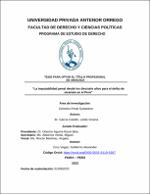| dc.contributor.advisor | Cruz Vegas, Guillermo Alexander | |
| dc.contributor.author | García Castillo, Leslie Viviana | |
| dc.creator | García Castillo, Leslie Viviana | |
| dc.date.accessioned | 2023-09-18T20:44:45Z | |
| dc.date.available | 2023-09-18T20:44:45Z | |
| dc.date.issued | 2023 | |
| dc.identifier.uri | https://hdl.handle.net/20.500.12759/11182 | |
| dc.description.abstract | Desde la puesta en vigencia del delito de sicariato este no ha estado exento de críticas, ya sea por su configuración típica y la confusión con el delito de homicidio por lucro, así como el sin número de casos que surgieron con la intervención de menores de edad, y la discusión no reciente de si es necesario que se reduzca o se adelante, al menos en ese delito contra la vida humana independiente, la imputabilidad por edad en el país. Se ha evidenciado a lo largo de la investigación que ya han existido intentos legislativos en el Perú en ese sentido, pero ninguna ha sido amparada y se ha hecho realidad con una concreta prescripción en el Código Penal.
En función a lo señalado se formuló como enunciado del problema el siguiente: “¿Cuáles son los fundamentos jurídicos que sustentarían la regulación de la imputabilidad penal desde los dieciseises años para el delito de sicariato en el Código Penal peruano?”, luego de lo cual se realizó un análisis de la doctrina, la legislación y el derecho comparado para determinar, utilizando los métodos históricos y comparativos, básicamente, que es necesario adelantar la edad de imputabilidad en el Perú, logrado establecer de forma concreta que se dan los fundamentos jurídicos necesarios y con legitimidad constitucional para que, acompañada a una política criminal preventiva, se debe, vía lege ferenda, reformar el articulo veinte inciso 2 del Código penal, para que la capacidad de culpabilidad se dese los dieciséis años de edad. Ello se plasmó en los resultados y también en las conclusiones. Con todo ello, se pudo contrastar y comprobar la hipótesis planteada de que el deber constitucional del Estado de protección a los ciudadanos y la facultad que la constitución ha conferido al legislador de dictar leyes especiales por exigencia de la naturaleza de las cosas, son fundamentos para sustentar la propuesta formulada. | es_PE |
| dc.description.abstract | Since the crime of assassination came into effect, it has not been exempting from criticism, either because of its typical configuration and the confusion with the crime of homicide for profit, as well as the number of cases that arose with the intervention of minors., and the not recent discussion of whether it is necessary to reduce or advance, at least in this crime against independent human life, the imputability by age in the country. It has been evidenced throughout the investigation that there have already been legislative attempts in Peru in this sense, but none have been protected and have come true with a specific prescription in the Penal Code.
Based on what has been indicated, the following was formulated as a statement of the problem: ““What are the legal foundations that would support the regulation of criminal imputability from the age of sixteen for the crime of hired assassins in the Peruvian Penal Code?““, after which An analysis of the doctrine, legislation and comparative law was carried out to determine, using historical and comparative methods, basically, that it is necessary to advance the age of imputability in Peru, managing to establish in a concrete way that the necessary legal foundations are given. and with constitutional legitimacy so that, accompanied by a preventive criminal policy, it is necessary, via lege ferenda, to reform article twenty, paragraph 2 of the Penal Code, so that the capacity of guilt is desired at sixteen years of age. This was reflected in the results and also in the conclusions. With all this, it was possible to contrast and verify the hypothesis that the constitutional duty of the State to protect citizens and the power that the constitution has conferred on the legislator to enact special laws as required by the nature of things, are foundations for support the proposal made. | en_US |
| dc.description.uri | Tesis | es_PE |
| dc.format | application/pdf | es_PE |
| dc.language.iso | spa | es_PE |
| dc.publisher | Universidad Privada Antenor Orrego | es_PE |
| dc.relation.ispartofseries | T_DEREP_025 | |
| dc.rights | info:eu-repo/semantics/closedAccess | es_PE |
| dc.rights.uri | https://creativecommons.org/licenses/by/4.0/ | es_PE |
| dc.source | Universidad Privada Antenor Orrego | es_PE |
| dc.source | Repositorio Institucional - UPAO | es_PE |
| dc.subject | Sicariato | es_PE |
| dc.subject | Imputabilidad | es_PE |
| dc.title | La imputabilidad penal desde los dieciséis años para el delito de sicariato en el Perú | es_PE |
| dc.type | info:eu-repo/semantics/bachelorThesis | es_PE |
| thesis.degree.level | Título Profesional | es_PE |
| thesis.degree.grantor | Universidad Privada Antenor Orrego. Facultad de Derecho y Ciencias Politicas | es_PE |
| thesis.degree.name | Abogado | es_PE |
| thesis.degree.discipline | Derecho | es_PE |
| dc.subject.ocde | https://purl.org/pe-repo/ocde/ford#5.05.00 | es_PE |
| renati.advisor.orcid | https://orcid.org/0000-0002-9119-5397 | es_PE |
| renati.author.dni | 72706107 | |
| renati.advisor.dni | 43414679 | |
| renati.type | https://purl.org/pe-repo/renati/type#tesis | es_PE |
| renati.level | https://purl.org/pe-repo/renati/level#tituloProfesional | es_PE |
| renati.discipline | 421016 | es_PE |
| renati.juror | Ortecho Aguirre, Roció Belu | |
| renati.juror | Albornoz Verde, Miguel. | |
| renati.juror | Rincón Martínez, Angela. | |
| dc.publisher.country | PE | es_PE |




